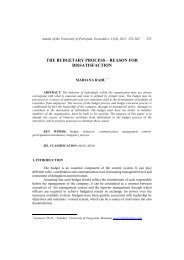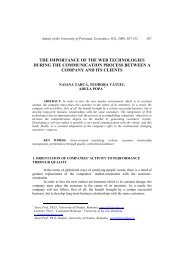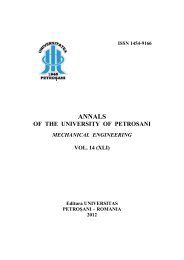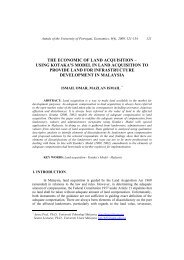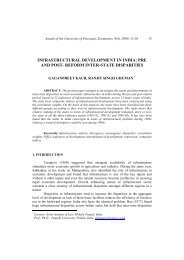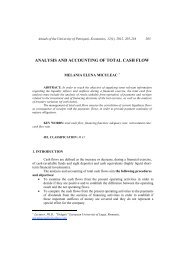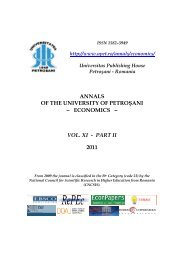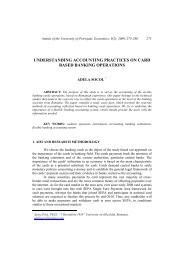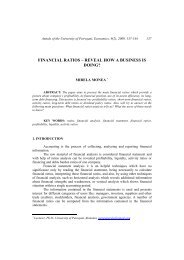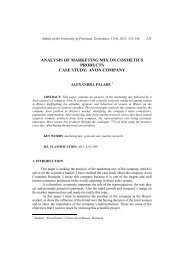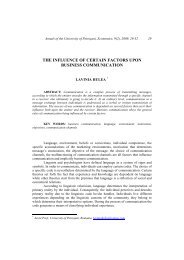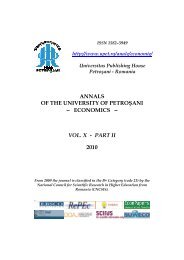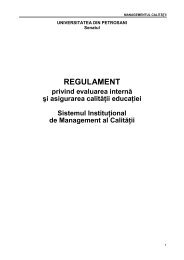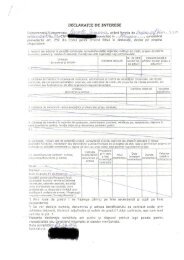annals of the university of petroÅani â¼ economics â¼ vol. xi - part i ...
annals of the university of petroÅani â¼ economics â¼ vol. xi - part i ...
annals of the university of petroÅani â¼ economics â¼ vol. xi - part i ...
You also want an ePaper? Increase the reach of your titles
YUMPU automatically turns print PDFs into web optimized ePapers that Google loves.
228 Răvaş, O.<br />
And last, convertibility will not diminish <strong>the</strong> growth <strong>of</strong> countertrade since<br />
convertibility does not necessarily mean availability <strong>of</strong> <strong>the</strong> hard currencies. Country<br />
advantages, bank credit crunch, growing demand for consumer goods, and<br />
convertibility will push <strong>the</strong> demand for countertrade to new heights.<br />
All <strong>of</strong> <strong>the</strong>se things--country advantages, bank credit crunch, growing demand<br />
for consumer goods and convertibility--will push <strong>the</strong> demand for countertrade to new<br />
heights.<br />
Countertrade policy is defined here as <strong>the</strong> company's attitude toward<br />
countertrade. While countertrade strategy is defined as <strong>the</strong> approach <strong>the</strong> company takes<br />
to countertrade planning and transactions. There are two basic types <strong>of</strong> countertrade<br />
policies: company advantage and mutual advantage.<br />
Under a company advantage policy, countertrade/<strong>of</strong>fset is used primarily for<br />
<strong>the</strong> company's benefit (to make a sale, to maintain market share, etc.), with <strong>the</strong> needs <strong>of</strong><br />
<strong>the</strong> buyer country being met at <strong>the</strong> minimum possible levels. Most companies follow<br />
this policy.<br />
The effectiveness <strong>of</strong> <strong>the</strong> company advantage policy varies. At best, it results in<br />
a satisfactory arrangement for both seller and buyer. At worst, it can be a disaster;<br />
companies may try to get out <strong>of</strong> <strong>the</strong>ir obligations once <strong>the</strong> sales contract is signed--on<br />
<strong>the</strong> <strong>the</strong>ory that it will be easier to pay <strong>the</strong> penalty than carry out <strong>the</strong> <strong>of</strong>fset--and <strong>the</strong>n get<br />
into a lot <strong>of</strong> trouble with <strong>the</strong> buyer country.<br />
In contrast, companies with a mutual advantage policy give <strong>the</strong> needs <strong>of</strong> <strong>the</strong><br />
buyer country equal weight with <strong>the</strong>ir own. Under this policy, <strong>the</strong> company is<br />
concerned with <strong>the</strong> goals <strong>of</strong> <strong>the</strong> buyer country (i.e., modernization, industrialization,<br />
balancing trade, increasing living standards, etc.), and how <strong>the</strong> countertrade transaction<br />
will help achieve <strong>the</strong>se goals. These companies are willing to meet <strong>the</strong> challenge <strong>of</strong><br />
achieving mutual benefit through countertrade, and in most cases <strong>the</strong>ir efforts are<br />
successful.<br />
The choice <strong>of</strong> a countertrade policy may be an early and deliberate decision on<br />
<strong>the</strong> <strong>part</strong> <strong>of</strong> <strong>the</strong> company president. More <strong>of</strong>ten, however, <strong>the</strong> policy e<strong>vol</strong>ves slowly,<br />
growing out <strong>of</strong> <strong>the</strong> company's experiences in trading with different companies. If <strong>the</strong><br />
company trades with "good" countries--those in which <strong>the</strong> state trading <strong>of</strong>ficials are<br />
well-intentioned, straight forward, and efficient in carrying out <strong>the</strong>ir side <strong>of</strong> <strong>the</strong> deal--it<br />
will probably develop a mutual advantage policy.<br />
There are also some cases in which <strong>the</strong> company begins to follow a mutual<br />
advantage policy in a <strong>part</strong>icular country because <strong>of</strong> a foreign-born executive's loyalty<br />
to that country, and <strong>the</strong>n expands <strong>the</strong> policy to include trade with o<strong>the</strong>r counties.<br />
Companies which have countertraded with "problem" countries usually hate<br />
countertrade; depending on how difficult <strong>the</strong>ir experiences are, <strong>the</strong>y will ei<strong>the</strong>r<br />
approach countertrade with extreme caution or wish it would disappear.<br />
If <strong>the</strong> company has encountered corrupt foreign <strong>of</strong>ficials, slow delivery or nondelivery<br />
<strong>of</strong> counter purchase products, poor quality products, sudden changes in<br />
product availability, demands for <strong>the</strong> moon (secret product formulas, proprietary<br />
technology, etc.) or o<strong>the</strong>r aggravations, it can hardly be blamed for following a<br />
company advantage policy.



